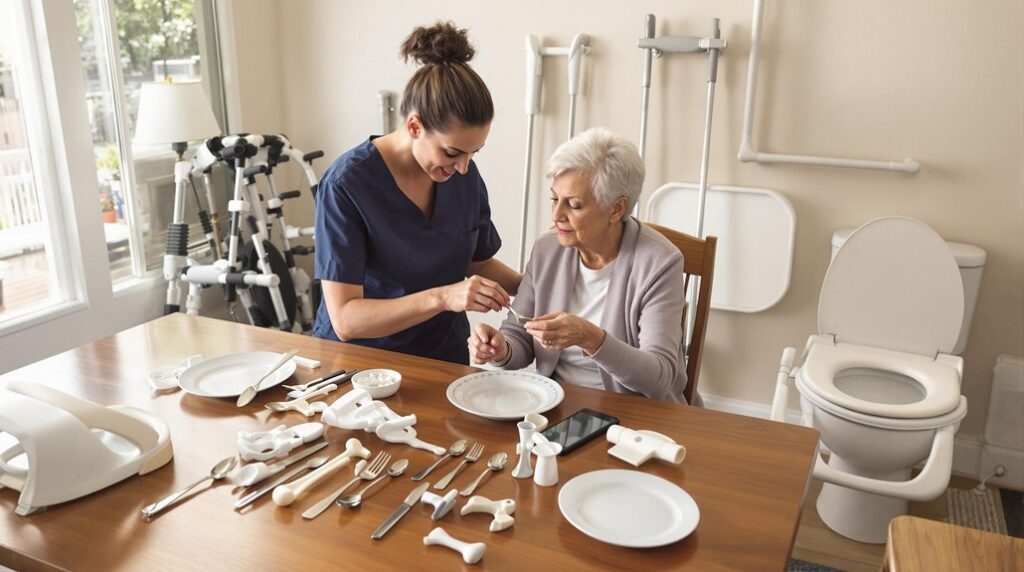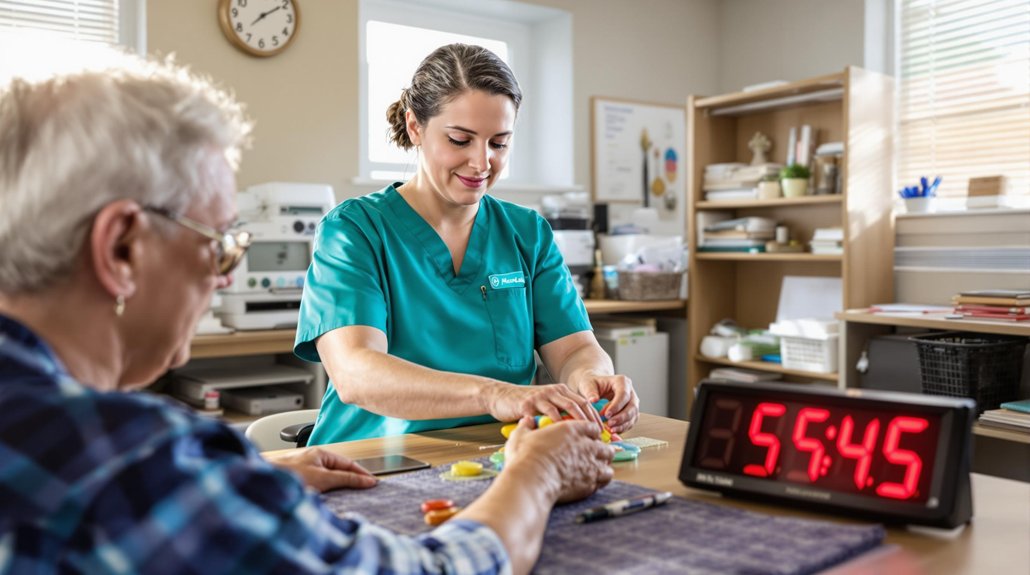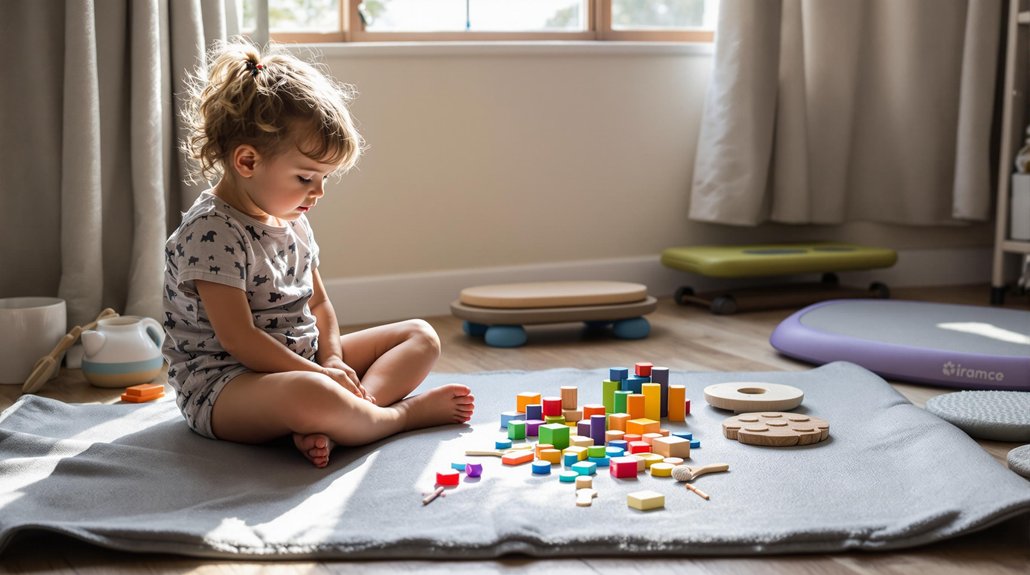An occupational therapist (OT) transforms your home into a safer, more accessible environment while teaching you essential daily living skills. They’ll assess your space, recommend modifications, and train you to use adaptive equipment effectively. You’ll learn strategies for daily tasks like dressing, bathing, and meal preparation, along with fall prevention techniques and memory-building exercises. Your OT will continuously monitor your progress and adjust goals as you work towards greater independence. There’s much more to discover about how an OT can enhance your home life.
Initial Home Assessment and Safety Evaluation
When an occupational therapist first visits your home, they’ll conduct a thorough assessment of your living space and daily routines.
During this evaluation, they’ll examine your home environment to identify potential risk factors that could impact your safety and independence.
The therapist will check your bathroom for slip hazards, assess your bedroom setup for transfer safety, and evaluate your kitchen’s accessibility.
They’ll measure doorway widths, analyze floor surfaces, and inspect lighting conditions throughout your home.
You’ll discuss your typical daily activities, including how you navigate different areas of your house and manage self-care tasks.
Based on their findings, your OT will create a personalized plan to address safety concerns and recommend specific modifications that can help you maintain independence while reducing accident risks in your home environment.
Following this initial assessment, your therapist will develop activities of daily living training to help you confidently perform essential self-care tasks.
Activities of Daily Living Support and Training
Once your home environment is assessed, your occupational therapist will focus on helping you master essential daily activities.
Through a holistic approach, they’ll work with you to improve tasks like dressing, bathing, meal preparation, and personal hygiene. Your OT will break down each activity into manageable steps, teaching you adaptive techniques and strategies that match your abilities.
Your therapist delivers personalized care by identifying your specific challenges and goals. They’ll introduce helpful tools and equipment while training you to use them effectively.
You’ll learn energy conservation methods, proper body mechanics, and safe transfer techniques for moving between surfaces. As you progress, your OT will adjust the training program to guarantee you’re gaining independence in the activities that matter most to you and your daily routine.
Fall prevention strategies are implemented throughout training to ensure maximum safety during daily activities at home.
Home Modification Recommendations
Based on their thorough evaluation, your occupational therapist will recommend specific modifications to enhance your home’s safety and accessibility.
Occupational therapists provide expert guidance on customizing your home environment to create a safer, more accessible living space.
They’ll assess your living space and suggest environmental adaptations that match your specific needs and abilities. These recommendations focus on maximizing your independence while ensuring you can safely navigate and use your home environment.
- Installation of grab bars in bathrooms, non-slip mats in showers, and raised toilet seats to improve bathroom safety and home accessibility
- Rearrangement of furniture to create clear pathways, removal of trip hazards like loose rugs, and addition of adequate lighting to prevent falls
- Modifications to kitchen setup, including reorganizing cabinets, suggesting adaptive equipment, and adjusting counter heights to accommodate mobility devices
Physical therapy services may be combined with occupational therapy to provide comprehensive mobility and rehabilitation support in your home environment.
Adaptive Equipment Selection and Training
Selecting the right adaptive equipment is a crucial part of your occupational therapist’s role during home visits. They’ll help you identify the most effective adaptive tools to support your daily activities and independence. Your OT will assess your specific needs and demonstrate how to properly use each piece of equipment.
| Equipment Type | Common Examples | Benefits |
|---|---|---|
| Mobility Aids | Grab bars, handrails | Enhanced safety during transfers |
| Self-Care Tools | Button hooks, reachers | Increased independence |
| Kitchen Devices | Jar openers, ergonomic utensils | Easier meal preparation |
Through equipment customization and hands-on training, your OT guarantees you’re comfortable using each device. They’ll adjust equipment settings, teach proper techniques, and monitor your progress. You’ll learn strategies to incorporate these tools into your daily routine while maintaining safety and efficiency. Consistent evaluation of progress helps ensure the adaptive equipment continues to meet your evolving needs.
Fall Prevention Strategies
Home safety goes beyond adaptive equipment, with fall prevention being a key focus of your OT’s home assessment. Your occupational therapist will work with you to identify potential fall hazards and recommend specific environmental modifications that can markedly reduce the risk of falls.
Fall prevention is crucial to home safety. Occupational therapists identify hazards and suggest modifications to create a secure living environment.
They’ll evaluate your home’s lighting, flooring conditions, and furniture placement to create a safer living space.
- Your OT will assess high-risk areas like bathrooms and stairways, suggesting practical solutions such as grab bars, non-slip mats, and improved lighting to enhance safety.
- They’ll help you organize your living space to eliminate clutter and create clear pathways for safe movement throughout your home.
- You’ll receive guidance on proper body mechanics and safe transfer techniques, empowering you to navigate your home with confidence.
Working with Focus Family Care provides access to experienced caregivers who can assist in implementing these crucial fall prevention strategies.
Caregiver Education and Support
When family members take on caregiving responsibilities, occupational therapists become invaluable partners in providing essential education and support.
Your OT will teach you proper body mechanics for safely assisting your loved one with transfers and daily activities, helping you prevent injury and reduce caregiver stress.
You’ll learn effective communication techniques to better understand and respond to your loved one’s needs, especially if they’re experiencing cognitive challenges.
Your OT will also show you how to break down complex tasks into manageable steps and demonstrate adaptive equipment use.
Beyond practical skills, your OT will connect you with local support groups, respite care services, and resources to maintain your own well-being.
They’ll help you establish routines that balance caregiving duties with self-care, ensuring you can sustainably support your loved one.
Recovery and Rehabilitation Planning
The path to recovery starts with a clear, personalized rehabilitation plan developed by your occupational therapist. Your OT will work with you to establish realistic timelines and personalized goals that align with your daily activities and lifestyle needs.
Through targeted therapeutic interventions, you’ll gradually build strength, improve function, and regain independence in your home environment.
- Your OT creates a structured program that adapts to your progress, incorporating exercises and activities that directly relate to your daily tasks.
- You’ll receive weekly progress evaluations to guarantee your rehabilitation plan remains effective and adjusts to your changing needs.
- Together with your OT, you’ll set achievable milestones that celebrate small victories while working toward larger recovery goals.
Cognitive and Memory Skills Development
Occupational therapists play an essential role in enhancing your cognitive abilities and memory skills through targeted exercises and real-world applications. They’ll work with you to develop strategies that improve your attention, problem-solving, and recall abilities using everyday activities.
Your OT will introduce memory exercises tailored to your needs, such as creating shopping lists, organizing medications, or managing a daily schedule. They’ll also incorporate cognitive games that challenge your mind while making the learning process engaging and practical. These might include matching activities, sequencing tasks, or puzzles that relate to your daily routines.
You’ll learn techniques to compensate for memory difficulties and build confidence in managing daily tasks independently. Your OT will adjust these activities as you progress, ensuring continued growth and success in your cognitive development.
Progress Monitoring and Goal Adjustment
Regular monitoring of your progress helps your OT make informed adjustments to your treatment plan and guarantees you’re meeting key milestones.
Through consistent goal tracking and outcome measurement, your OT can identify which strategies are working best for you and where you might need additional support.
- Your OT will document your achievements using standardized assessments and functional tests to measure improvements in your daily activities.
- You’ll participate in regular progress reviews where your OT will discuss your advancement and collaborate with you to modify goals based on your changing needs.
- If certain interventions aren’t producing desired results, your OT will adapt your treatment plan, ensuring you’re always working toward meaningful and attainable objectives.
Together, you and your OT will maintain a dynamic approach to your recovery, celebrating successes while continuously refining your path to independence.
Conclusion
An Occupational Therapist will work alongside you at home, making everyday tasks easier and safer. Think of them as your personal coach, helping you master everything from getting dressed to cooking meals. They’ll guide you step by step, celebrating small wins and building your confidence along the way. When things feel challenging, your OT is there with gentle encouragement and practical solutions that work for your unique needs.
You don’t have to face daily challenges alone. Our caring team at Focus Family Care understands your journey and is ready to help you or your loved one live more independently at home. Every step forward, no matter how small, is a victory worth celebrating.
If you or a loved one need help, don’t wait. Reach out to Focus Family Care today at (561) 693-1311 or email us at info@focusfamilycare.com.





